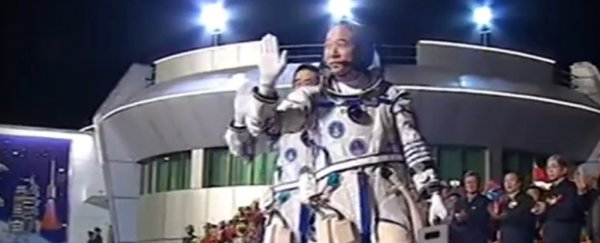China has launched two astronauts into space, where they'll spend 30 days living and performing experiments on board the Tiangong 2 space lab.
The expedition will be the longest stay in space for Chinese astronauts to date, and will help them prepare for future crewed missions to the Moon and Mars, and achieve their goal of having a permanent space station in orbit by 2022.
The two astronauts, 49-year-old Jing Haipeng (who has already been to space twice) and 37-year-old Chen Dong, launched from the Jiuquan Satellite Launch Centre in the Gobi Desert at 23:30 GMT.
They'll ride up and back in the Shenzhou-11 spacecraft, which was lifted by a Long March-2F rocket, and within two days will dock with Tiangong 2.
This was China's sixth manned space launch, but to date the country's astronauts have only spent 15 days into space, so this will double the length of a crewed mission.
While on board, the astronauts will carry out a range of experiments, such as growing plants in space and using ultrasound equipment to test the effects of space on their own bodies.
They'll also be testing computers, as well as propulsion and life support systems on board Tiangong 2.
Tiangong is Chinese for "heavenly palace", and it was launched last month to become the second of China's space labs in orbit.
The first space lab, Tiangong 1, was launched in 2011 and docked with three rockets, but a few weeks ago China admitted that it had lost control of the spacecraft, and it was on a collision course with Earth in 2017.
It's hoped that this second space lab will have more luck, and extra modules will be added over the new few years with the goal of being a fully operational space station by 2022.
China is only the third country, after Russia and the US, to launch its own crewed missions. But it was excluded from the International Space Station due to concerns over its military ambitions - which is why it's now aiming to create its own that it hopes will operate for at least a decade.
The BBC reports that the launch was declared a success around 15 minutes after lift-off, and Chinese President Xi Jinping put out a congratulatory message in state-owned media saying he hoped the astronauts "vigorously advance the spirit of space travel".
He added that this mission would "enable China to take larger and further steps in space exploration, and make new contributions to building up China as a space power".
China has been heavily investing in space over the past few years, and had planned to launch at least 20 space missions in 2016.
It's already landed a rover on the Moon (RIP Jade Rabbit), and now plans to launch another lunar probe to the far side of the Moon by 2018. By 2020, the country wants to send an unmanned rover to Mars, before it launches a crewed lunar mission in 2025.
Let's just hope the Chinese Space program gets a little better at communicating with the rest of the international space community before then, with planetary scientist Monica Grady commenting over at The Conversation that it currently "operates almost completely independently of other space agencies".
We wish Haipeng and Dong the best of luck on this latest crewed mission, and can't wait to see what they do next. Onwards and upwards.
